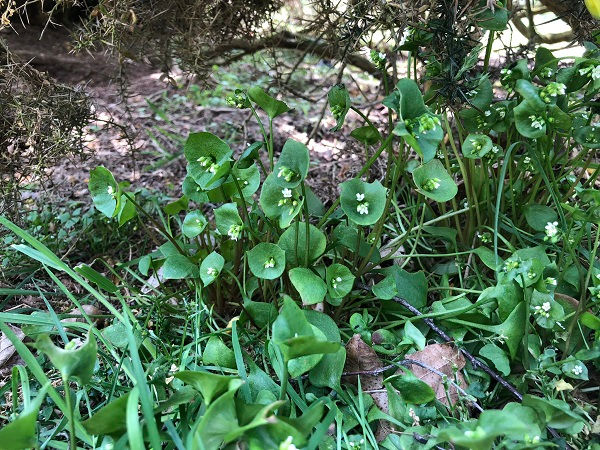Miner's lettuce - Claytonia perfoliata
- The Foraging Course Company
- Feb 10
- 2 min read

Edible plant - novice Season - leaves: winter to spring, flowers: spring to summer Common names Miner's lettuce, winter purslane, Indian purslane, spring beauty
Scientific name meaning: Clayton is derived from the name of a botanist in the 1600s - John Clayton. Perfoliata comes from the Latin Per, meaning through, and foliata, meaning foliage. It is a reference to the flowers passing through the foliage
Habitat  A native of North America, miner's lettuce was introduced to Britain in 1794. It has since naturalised and can be found on disturbed ground, gardens, parks, waste ground and dunes. It likes sandy soils, and will grow in dry or moist conditions. |
Overall structure  Starting off as low growing clusters of long-stalked arrow shaped leaves, miner's lettuce then pushes up flower stems reaching up to 30cm. It is often found in large drifts. |
Leaves  The leaves have long stalks that terminate in an arrow shaped tip. They flower stem leaves are circular (they are, in fat, two fused leaves) and appear at the terminal end of the flower stem. |
Stem  The flower stems are cylindrical, hairless and can reach 30cm tall. They flower stem leaves are circular and are at the terminal end of the stem. |
Flowers  The flowers emerge from the centre of the circular stem leaves. The inflorescence is a raceme of small five-petalled white flowers. |
Seeds  The inflorescence lengthens as flowering takes place meaning the fruits are further apart than the flowers. The spherical seeds are brown when ripe. |
Possible lookalikes  Miner's lettuce has very distinctive in flower but could possibly be confused with the poisonous petty spurge (Euphorbia peplus), pictures. However, the stem leaf of miner's lettuce is solid and does not narrow inwards to the stem. In addition, petty spurge has green-yellow flowers, whereas miner's lettuce has white flowers.
|
Use as a food Can be eaten raw or cooked. It has a mild taste and nice bite as a salad leaf but can get a little slimy when cooked Use in herbal medicine and medicine Has been used as a diuretic and laxative, and to help with rheumatism
If you are suffering from any ailment or need medical advice, please see your General Practitioner.
Hazards None known
Other uses None known Importance to other species The flowers provide a source of nectar for pollinators
Always stay safe when foraging. You need to be 100% sure of your identification, 100% sure that your foraged item is edible, and 100% sure that you are not allergic to it (it is good practice to always try a small amount of any new food you are consuming). If in doubt, leave it out!

Comments